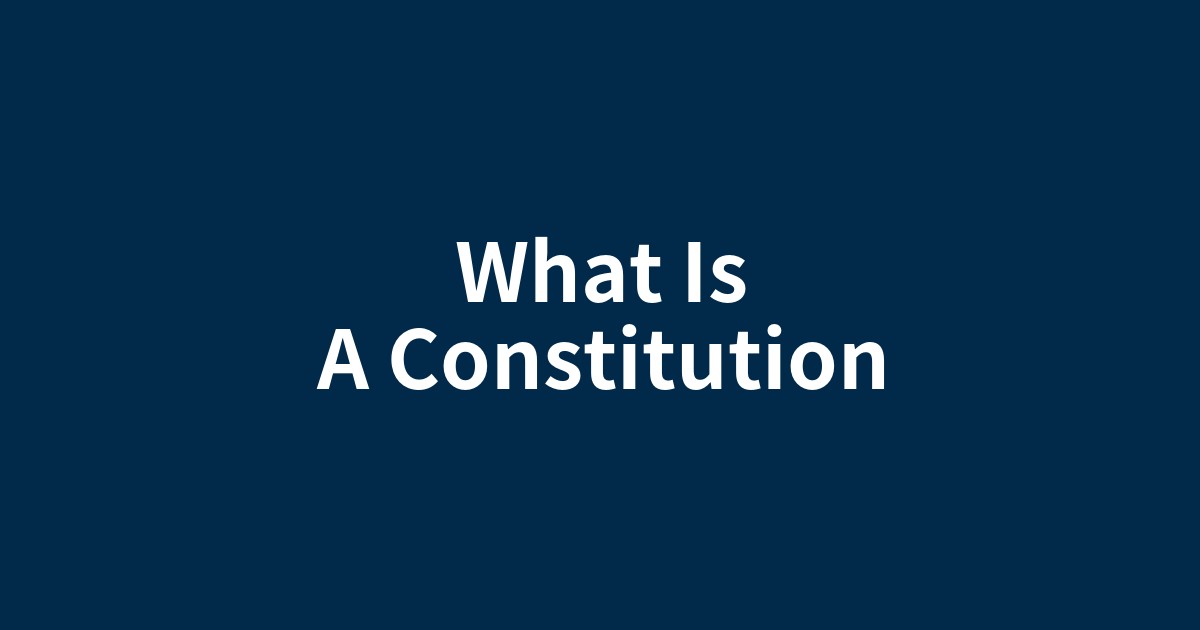このページは、歴史や文化の物語を楽しみながら、その文脈の中で重要な英単語を自然に学ぶための学習コンテンツです。各セクションの下にあるボタンで、いつでも日本語と英語を切り替えることができます。背景知識を日本語で学んだ後、英語の本文を読むことで、より深い理解と語彙力の向上を目指します。

【ご注意】
この記事には、健康、金融、法律など、読者の人生に大きな影響を与える可能性のある情報が含まれています。内容は一般的な情報提供を目的としており、専門的なアドバイスに代わるものではありません。重要な判断を下す前には、必ず資格を持つ専門家にご相談ください。
なぜ憲法は、他の法律よりも強い力を持つのか。国家権力を縛り、国民の権利を守るという、近代憲法のfundamental(根本的な)役割を学びます。
この記事で抑えるべきポイント
- ✓憲法は単なる法律集ではなく、国家権力を制限し、国民の基本的な権利を守るために存在する「最高法規」であること。
- ✓近代憲法の根底には「立憲主義」という思想があり、その起源は王などの絶対的な権力者を法で縛ろうとした人類の長い闘いの歴史に遡ることができること。
- ✓憲法がその最高法規としての役割を安定して果たすため、多くの国では、時の権力者が安易に変更できないよう、改正手続きが厳しく定められていること(硬性憲法)。
- ✓憲法は、権力を立法・行政・司法に分ける「権力分立」という具体的な仕組みを通じて、権力の濫用を防ぎ、国民の自由を保障していること。
憲法とは何か ― 国家の最高法規
私たちの社会には、数多くの法律が存在します。では、なぜその法律の上に、さらに「憲法」という特別なルールが必要なのでしょうか?この素朴な疑問こそ、国家と個人の関係を考える上で最も重要な出発点です。この記事では、憲法が単なる法律集ではなく、国家という強大な権力を縛り、私たちの自由を守るための「盾」であり「鎖」でもあるという本質的な役割を、歴史を紐解きながら探求していきます。
What is a Constitution? — The Supreme Law of the Land
Our society has numerous laws. So, why do we need a special set of rules called a "constitution" aboveこれらの laws? This simple question is the most crucial starting point for considering the relationship between the state and the individual. In this article, we will explore the essential role of a constitution—not merely as a collection of laws, but as a "shield" and "chain" that binds the immense power of the state to protect our freedoms, by delving into its history.
「王も法の下に」― 立憲主義の夜明け
憲法の考え方の根っこを探るには、歴史を遡る必要があります。かつて、王や皇帝が絶対的な権力を持っていた時代、彼らの言葉はそのまま法でした。しかし、人々はその無制限な権力が、いかに容易に個人の自由や財産を脅かすかを痛感します。この状況に「待った」をかけたのが、13世紀イギリスで成立した「マグナ・カルタ」です。これは、王の権力を法によって制限しようとする画期的な試みでした。「王といえども神と法の下にある」という思想は、権力者は法に従うべきだという近代的な考え方の礎を築きました。この、憲法に基づいて国家権力を制限し、国民の権利を守ろうとする理念こそが「立憲主義(constitutionalism)」であり、現代の憲法が持つ最も重要な心臓部なのです。
"The King is Under the Law" — The Dawn of Constitutionalism
To trace the roots of the idea of a constitution, we must travel back in time. In an era when kings and emperors held absolute power, their word was law. However, people keenly felt how this unlimited power could easily threaten individual liberty and property. The "Magna Carta," established in 13th century England, put a stop to this situation. It was a groundbreaking attempt to limit the king's power by law. The idea that "the king himself ought to be subject to God and the law" laid the foundation for the modern concept that rulers must obey the law. This principle, of limiting state power and protecting citizens' rights based on a constitution, is known as constitutionalism, and it forms the very heart of modern constitutions.
国家の設計図 ― なぜ憲法は「最高法規」なのか?
憲法は、他の法律よりも優先される「最高法規」としての地位を確立しています。それはなぜでしょうか。憲法が、いわば「国家の根本的な設計図」だからです。この設計図には、国をどのように治めるかという統治の仕組み(government)の骨格や、国民が生まれながらに持ち、誰にも奪うことのできない譲れない権利、すなわち「基本的人権(fundamental rights)」が定められています。国のあり方を最終的に決める力、すなわち主権(sovereignty)が国民にあると定めること(国民主権)も、近代憲法の最も重要な原則の一つです。そのため、国会が制定する個別の法律であっても、この根本的な設計図である憲法に反するものは効力を持たないとされています。そして、その判断を下すのが、裁判所が持つ「違憲審査(judicial review)」という重要な権限なのです。
The Blueprint of a Nation — Why is the Constitution the "Supreme Law"?
A constitution holds a status as the "supreme law," taking precedence over other laws. Why is this so? It is because a constitution is, in essence, the "fundamental blueprint of a nation." This blueprint defines the framework of how the country is to be run—the structure of its government—and the inalienable, fundamental rights that citizens possess from birth. Defining that the ultimate power to decide the nation's course, or sovereignty, rests with the people (popular sovereignty) is one of the most important principles of a modern constitution. Therefore, even individual laws enacted by a parliament are considered invalid if they contradict this fundamental blueprint. The crucial power to make that determination is the judicial review held by the courts.
権力を分ける、自由を守る ― 権力分立という知恵
「権力は腐敗しやすく、絶対的な権力は絶対に腐敗する」という言葉が示すように、歴史は権力が一つに集中することの危険性を繰り返し証明してきました。この教訓から生まれたのが、「権力分立(separation of powers)」という統治の知恵です。これは、強大な国家権力を、法律を作る「立法」、法律を執行する「行政」、法を解釈し適用する「司法」の三つに分け、それぞれを異なる機関に担当させる仕組みです。さらに、三つの権力が互いに監視し、行き過ぎを抑制し合う「抑制と均衡」のメカニズムを組み込むことで、権力の濫用を防ぎ、国民一人ひとりの自由と権利が侵害されないように守っているのです。
Separating Power, Protecting Freedom — The Wisdom of the Separation of Powers
As the saying goes, "Power tends to corrupt, and absolute power corrupts absolutely." History has repeatedly demonstrated the dangers of concentrating power in one place. The wisdom of governance born from this lesson is the separation of powers. This mechanism divides the immense power of the state into three branches: the "legislative," which makes laws; the "executive," which enforces laws; and the "judicial," which interprets and applies laws, assigning each to a different body. Furthermore, by incorporating a system of "checks and balances" where the three branches monitor and restrain each other, it prevents the abuse of power and protects the freedom and rights of every citizen.
簡単には変えられない「重み」― 硬性憲法という仕組み
ニュースなどで、憲法改正の議論を耳にすることがあります。しかし、憲法の改正は、通常の法律のように国会の多数決だけで簡単に行うことはできません。なぜ、これほどまでに手続きが厳格なのでしょうか。それは、憲法が国家の根本を定める極めて重要な法だからです。時の政権や、一時的な世論の熱狂によって、国家の基本的なあり方や国民の権利が安易に変更されてしまう事態を防ぐ必要があります。そのため、多くの国の憲法は、国民の権利を長期的に保障(guarantee)するため、国民投票を経るなど、極めてハードルの高い改正(amendment)手続きを定めています。この「変えにくさ」こそが、憲法に安定性と重みを与え、最高法規としての役割を支えているのです。
The "Weight" of Being Hard to Change — The Mechanism of a Rigid Constitution
We sometimes hear discussions about constitutional reform in the news. However, amending a constitution cannot be done as easily as passing a regular law with a simple majority in parliament. Why are the procedures so strict? It is because the constitution is an exceptionally important law that defines the very foundation of the nation. It is necessary to prevent the fundamental nature of the state and the rights of the people from being easily altered by the government of the day or temporary public fervor. For this reason, many countries' constitutions establish extremely high hurdles for amendment, such as requiring a national referendum, in order to guarantee citizens' rights over the long term. This "difficulty to change" is what gives a constitution its stability and weight, supporting its role as the supreme law.
結論 ― 私たちの暮らしを支える根本的なルール
これまで見てきたように、憲法は、権力者の気まぐれから国民を守るために生まれた、人類の長い闘いの歴史が生んだ知恵の結晶です。それは、国家権力を制限する「鎖」であり、私たちの自由と尊厳を守る「盾」でもあります。憲法が定めるルールは、私たちの日常生活や社会のあり方を支える、まさに根本的(fundamental)な土台と言えるでしょう。この国の主権者として、その価値を理解し、憲法というルールに主体的に関わっていくこと。それこそが、未来にわたって自由な社会を維持していくための、私たち一人ひとりに課せられた責任なのかもしれません。
Conclusion — The Fundamental Rules that Uphold Our Lives
As we have seen, a constitution is the crystallization of wisdom born from humanity's long struggle to protect citizens from the whims of those in power. It is a "chain" that limits state power and a "shield" that protects our freedom and dignity. The rules set forth in a constitution can be described as the truly fundamental foundation that supports our daily lives and society. As sovereign citizens of this country, understanding its value and actively engaging with the rules of the constitution may be the very responsibility entrusted to each of us to maintain a free society for the future.
テーマを理解する重要単語
guarantee
憲法が国民の権利を「保障する」という文脈で極めて重要な単語です。単なる口約束ではなく、国家が法的拘束力をもって権利の実現を請け負うという、非常に強い意味合いを持ちます。この記事が憲法を、私たちの自由と尊厳を守る「盾」と表現しているように、その保護機能を象徴する動詞と言えるでしょう。
文脈での用例:
The constitution is designed to guarantee the rights of all citizens.
憲法は、すべての市民の権利を保障するために作られている。
executive
権力分立を構成する三権の一つ、「行政」を指します。法律を現実に執行する権能や、それを行う機関(内閣など)を意味します。この記事の文脈では、強大な権力を持つ可能性があるため、立法府や司法府による「抑制と均衡」の対象となる存在として描かれています。権力分立の力学を理解する上で不可欠です。
文脈での用例:
The executive branch carries out and enforces laws.
行政府は法律を執行し、施行する。
fundamental
物事の土台を成す、最も重要で不可欠な要素を指す形容詞です。この記事では「基本的人権(fundamental rights)」や、憲法が社会の「根本的な土台(fundamental foundation)」であると繰り返し述べられています。憲法が持つ、他の法律とは一線を画す重要性と本質的な役割を理解する上で鍵となる単語です。
文脈での用例:
A fundamental change in the company's strategy is needed.
その会社の方針には根本的な変更が必要だ。
supreme
この記事の主題である「国家の最高法規(supreme law)」を理解するための核となる単語です。単に「最も良い」という意味ではなく、法秩序や権力の階層において「頂点に立つ」という絶対的な地位を示します。憲法が他のいかなる法律よりも優先されるという、その本質的な役割を把握するために不可欠な一語です。
文脈での用例:
The Supreme Court is the highest judicial body in the country.
最高裁判所は、その国で最も高い位置にある司法機関です。
government
日本語の「政府」よりも広い、「統治の仕組み」や「政治体制」全体を指すことがある単語です。この記事では、憲法が国家の設計図として「統治の仕組み(government)」の骨格を定めると説明しています。この幅広い意味合いを捉えることで、憲法が単なる行政機関だけでなく、国全体の運営方法を規定していることが理解できます。
文脈での用例:
The government announced new policies to support small businesses.
政府は中小企業を支援するための新しい政策を発表した。
amend
単なる「変更(change)」と異なり、公式な手続きを踏んで文書や法律の条文を「改正する」という、よりフォーマルなニュアンスを持つ動詞です。この記事では、憲法がなぜ簡単には改正できないのかを論じており、その「重み」の理由を理解する鍵となります。時の権力者の都合で根本ルールが変えられないようにする仕組みの重要性がわかります。
文脈での用例:
It is extremely difficult to amend the constitution.
憲法を改正することは極めて難しい。
judicial
権力分立を構成する三権の一つ、「司法」を指します。法を解釈し、具体的な事件に適用する権能や、それを行う裁判所などを意味します。この記事では、特に「違憲審査権(judicial review)」を持つ、憲法の番人としての役割が強調されています。国家権力を法で縛るという立憲主義の理念を体現する重要な部門です。
文脈での用例:
The case is currently under judicial review.
その事件は現在、司法審査中である。
sovereignty
「主権」は、国家のあり方を最終的に決定する権力がどこにあるかを示す、政治の基本概念です。この記事では、その力が国民にあるとする「国民主権」が近代憲法の重要原則だと解説しています。この単語は、憲法が定める国家の根本設計、すなわち「誰がこの国の主役なのか」を理解する上で欠かせません。
文脈での用例:
The nation fought to defend its sovereignty against foreign invasion.
その国は外国の侵略から自国の主権を守るために戦った。
legislative
権力分立を構成する三権の一つ、「立法」を指します。法律を制定する権能や、それを行う機関(国会など)を意味します。この記事では、法律を執行する「行政(executive)」や、法を解釈する「司法(judicial)」との関係性の中で解説されています。三権の役割の違いを明確に理解する上で重要な単語です。
文脈での用例:
The legislative branch is responsible for making laws.
立法府は法律を制定する責任を負っている。
checks and balances
権力分立(separation of powers)を実質的に機能させるための具体的な仕組みです。三権が互いに監視し、行き過ぎを抑制し合う動的なプロセスを指します。権力を単に分けるだけでなく、相互に牽制させることが自由の保護に繋がるという、この記事で説かれる統治の知恵の核心をなす概念です。
文脈での用例:
The system of Checks and Balances prevents any one branch of government from becoming too powerful.
抑制と均衡のシステムは、政府の一部門が強力になりすぎるのを防ぎます。
constitutionalism
「立憲主義」は、この記事の歴史パートを貫く最も重要な理念です。国家権力を憲法によって制限し、国民の権利を守るという考え方そのものを指します。この単語を理解することで、なぜ「王も法の下に」という思想が生まれ、現代憲法の心臓部となったのか、その歴史的な文脈を深く読み解くことができます。
文脈での用例:
Modern democracy is founded on the principle of constitutionalism.
現代の民主主義は、立憲主義の原則に基づいています。
judicial review
「違憲審査」は、憲法が最高法規であることを実質的に保証する重要な制度です。法律や命令が憲法に違反していないかを裁判所が判断する権限を指します。この記事では、国会が作った法律でさえも憲法に反すれば無効になるという、立憲主義の具体的な仕組みを説明しており、その核心を担うのがこの概念です。
文脈での用例:
The court exercised its power of judicial review to strike down the law.
裁判所は違憲審査権を行使し、その法律を無効とした。
separation of powers
「権力は腐敗する」という歴史の教訓から生まれた、国家統治の知恵です。強大な国家権力を立法・行政・司法の三つに分け、権力の集中と濫用を防ぐ仕組みを指します。この記事で紹介されている、自由を守るための具体的な統治メカニズムの根幹であり、現代国家の構造を理解する上で必須の用語です。
文脈での用例:
The U.S. Constitution is based on the separation of powers among the legislative, executive, and judicial branches.
アメリカ合衆国憲法は、立法、行政、司法の三権分立に基づいている。
inalienable
基本的人権の性質を説明する上で最も重要な形容詞の一つです。「譲ることができない」という意味から、国家権力ですら侵害することが許されない、個人に固有の権利であることを示します。この記事の「生まれながらに持ち、誰にも奪うことのできない譲れない権利」という部分の核心を捉えるための単語であり、人権の重みを正確に理解できます。
文脈での用例:
The Declaration of Independence states that all men have certain inalienable rights.
独立宣言は、すべての人間が特定の譲渡不可能な権利を持つと述べている。